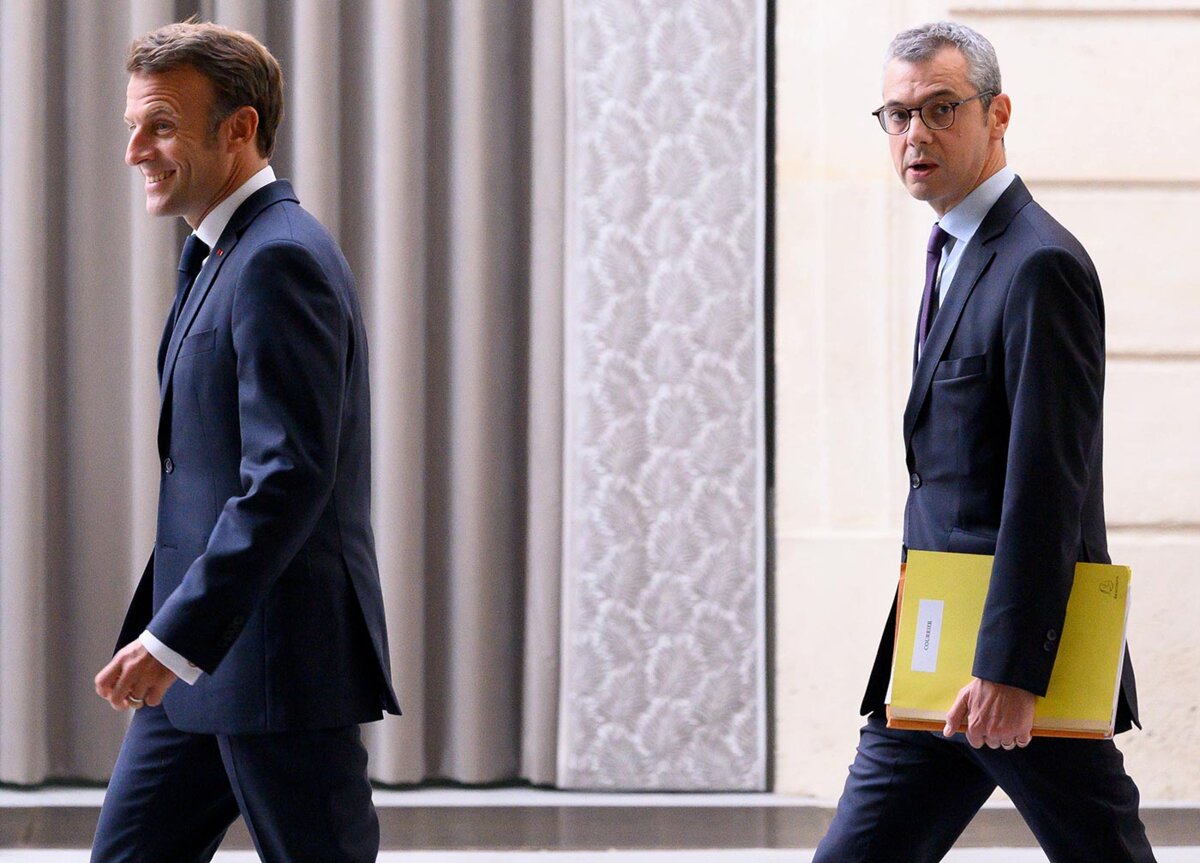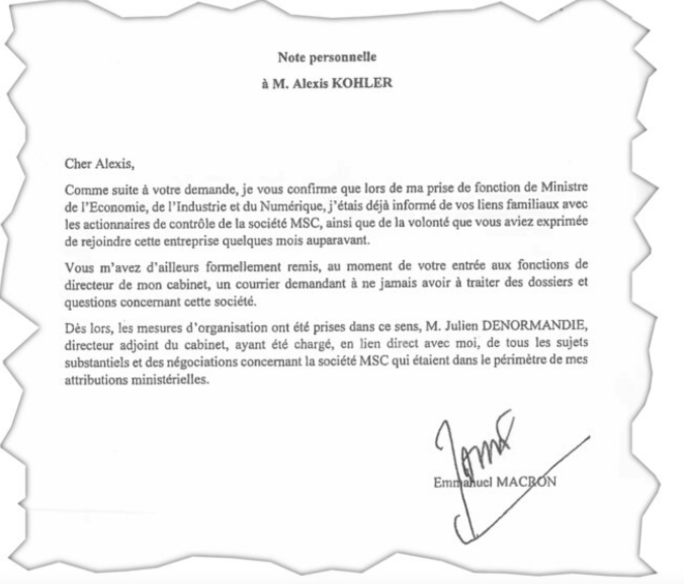It is the scenario that Emmanuel Macron did not want hear about. Whenever anyone tried to warn him of the potential blow to his authority if his chief of staff Alexis Kohler faced legal proceedings, the president flatly dismissed the concerns. Immediately after his re-election as president in April, some of those closest to Macron were still trying to persuade him not to keep Alexis Kohler on as the secretary-general of the Élysée, the top aide's official title. But Emmanuel Macron brushed all advice and warnings.
The president could simply not imagine doing without his chief of staff who has virtually become the vice president, someone who has overseen and made key decisions taken by the state. But the Élysée's sense of denial has now run up against the reality of the justice system. On Monday October 3rd the financial crimes prosecution unit, the Parquet National Financier (PNF), confirmed a report by France Info radio and said in a statement that Alexis Kohler had recently been placed under formal investigation for the “unlawful acquisition of an interest” in relation to the affair involving the MSC shipping company. The president's chief of staff was also at the same date - September 23rd - placed under the status of “assisted witness” for “influence peddling” in the case. In French law this status is used for someone who is closely involved in a case but where there is not enough evidence to consider them a formal suspect. Prosecutors said “no form of judicial supervision” has been placed on Alexis Kohler.
Even though the government has already done all it can to minimise it, this development is set to have a devastating or even explosive impact. Never before has a secretary-general at the Élysée faced a judicial investigation while still in post. The case risks leaving an indelible stain on the government.
The proceedings follow a formal legal complaint – including a civil suit - for “unlawful acquisition of an interest”, “influence peddling” and “failing to follow ethical rules” lodged against Alexis Kohler in 2020 by the anti-corruption non-governmental organisation Anticor. The claims are that the president's chief of staff did not publicly disclose his family links with the MSC maritime transport company, did not recuse himself from matters involving the company, and that he intervened in the group's favour on several occasions.
“This placing under formal investigation, coming after [justice minister] Éric Dupond-Moretti was sent to face trial this morning [editor's note, see full story here] highlights the importance of an anti-corruption organisation,” Anticor's president Élise Van Beneden said on Monday. “The Kohler affair has been a lengthy battle which has gone on since 2018. This formal investigation should have occurred much sooner. It shows that the case should not have been dropped by the PNF [editor's note, an initial investigation was dropped in August 2019]. It shows we were right to make a complaint, to ask for an independent investigation by an investigating judge.”

Enlargement : Illustration 1

In a statement, Alexis Kohler's lawyer Éric Dezeuze said on Monday that his client “strongly denies having committed any offence”. The lawyer said: “Without taking into consideration at this stage the many objective pieces of exculpatory evidence, Alexis Kohler has been placed under formal investigation for the 'unlawful acquisition of an interest' over facts that could go back more than ten years.” Éric Dezeuze added that the “next part of the proceedings, to which he now has access” will “allow him to demonstrate his innocence”.
After a lengthy investigation the investigating judge, Virginie Tilmont, took the view that there existed enough serious and consistent evidence to place Alexis Kohler under investigation. In French law this is one step short of charges being brought. The offence of “unlawful conflict of interest” is defined in law as: “The act, by a person acting under public authority or charged with a public service mission or by a person who holds elected office, of taking, receiving or maintaining, either directly or indirectly, any interest whatsoever in a business or operation over which, at the time of the act, either in its entirety or partially, they have responsibility for oversight, administration, winding up or making payments”. It is punishable by a five-year jail term and a fine of 500,000 euros.
Organised protection
For years the Élysée, the Ministry of Finance, the Treasury department, the Agence des Participations de l’État (APE) and all those close to him have tried to deny that there was any case to investigate. In their view Alexis Kohler was a model senior civil servant of “integrity” who is “irreproachable”. But this did not stop him from knowingly circumventing the law and ethical codes for years.
Ever since his arrival at the Agence des Participations de l’État - the body which oversees the French state's stakes in companies – in 2008, Alexis Kohler has known that he had a conflict of interest. He is a close cousin of Gianluigi Aponte, founder of the Italian-Swiss maritime transport group MSC. This group is frequently involved in negotiations with the French state because it is one of the main clients of the partly publicly-owned shipyard at Saint-Nazaire (formerly known as STX France). Only a few people close to him were in on the secret of this close family tie; they protected him and helped him organise his own impunity from any claims of wrongdoing. Without Mediapart's initial investigation, published in 2018, this relationship would have stayed unknown, including within the Ministry of Finance and the APE.
This situation could have led Alexis Kohler to keep his distance and avoid any matters that had links with MSC. On the contrary, however, he agreed to become an administrator representing the French state both at the northern port of Le Havre and at STX France in the west. Both companies have a direct relationship with MSC. During their investigation, detectives from the French fraud squad found out that at STX France Alexis Kohler had “taken part in five votes favourable to operations that had a link to MSC”, and did the same at least once while he was a state administrator at Le Havre port.

Enlargement : Illustration 2

But Alexis Kohler's involvement did not stop there. As deputy chief of staff to the finance minister at the time, Pierre Moscovici, he continued to keep an eye on the interests of the maritime transport company, whether this concerned contracts with the shipyards at Saint-Nazaire or dealing with public financial backing for the group. Despite statements given by those close to him, no trace of procedures to recuse himself has ever been found in the Finance Ministry's archives, including any mention of them in his administrative file.
In 2014 Alexis Kohler, carefully hiding his family links to the group and his interventions in their favour, asked the civil service ethics committee if he could leave public service and join MSC as director of the group's cruise line operations. Was the committee discreetly informed about Alexis Kohler's situation? In any case, it refused his request to move to the company, to the great anger of both the civil servant and his friends.
In the end this refusal probably worked to his advantage: Alexis Kohler went on to become the chief of staff to Emmanuel Macron - with whom he was in regular contact after the latter had been made deputy chief of staff at the Élysée – when the future president was appointed economy minister in the summer of 2014. Thanks to a statement signed by his minister, Alexis Kohler was then given the go-ahead by the ethics committee to join MSC at the end of 2016 – the time when Macron was launching his tilt at the presidency.
This was a period when Alexis Kohler was omnipresent: he was finance director at MSC and director of Emmanuel Macron's 'En Marche!' campaign, while at the same time negotiating with former colleagues over the dossier concerning the Saint-Nazaire shipyards and funding for MSC. None of this seemed to bother anyone.
The MSC dossier closely monitored at the Élysée
After Emmanuel Macron was elected as president in 2017 Alexis Kohler joined the Élysée team and became the head of state's right-hand man. At the same time some issues that were of concern to MSC and which appeared to have been held up were rapidly unblocked. In July 2017 the finance minister, Bruno Le Maire, quite unexpectedly announced that the shipyards at Saint-Nazaire were to be nationalised, something Gianluigi Aponte wanted. Afterwards MSC obtained its first export credit guarantee from SFIL, a subsidiary of the public sector financial institution the Caisse des Dépôts. In all, the shipping company obtained 2.6 billion euros in loans at unbeatable rates, thanks to the state-backed guarantee and an under-estimation of the risks.
Despite what he has said, Alexis Kohler was never far from the MSC dossier. “We have indeed seen that the help provided to MSC was very much appreciated in high places and we have got the support of Alexis Kohler for good,” stated one SFIL manager in a note written in November 2020. After Mediapart published details of this report, SFIL insisted it did not exist. Mediapart stands by its story.

Enlargement : Illustration 3

Meanwhile, the MSC file had become a tricky one for Alexis Kohler. During their preliminary investigation, investigators from the PNF wrote a vitriolic report about the machinations of the Élysée secretary-general. On July 1st 2019, when there was a power vacuum at the PNF – its boss Éliane Houlette had just left her post – Emmanuel Macron sent a letter stating that Alexis Kohler had fully respected all the ethical rules. The declaration, signed by the French president, was as good as an order: during that summer the investigation was dropped by the PNF amid the greatest possible discretion.
The Élysée's new legal doctrine
The Élysée hoped that this was an end to the affair. But a new complaint filed by Anticor to investigating judges restarted the case. With the utmost discretion, Judge Virginie Tilmont began an investigation. More and more damning evidence came to light. In his office at the Élysée, meanwhile, Alexis Kohler was still thinking of a move back to MSC.
“If Alexis Kohler is placed under investigation he could not stay on as secretary-general of the Élysée. His position and that of the Elysée would be untenable. As for France's image...” said someone close to the case only very recently. Yet the new legal doctrine that the government is currently drawing up at breakneck speed to cover the cases of Éric Dupond-Moretti and Alexis Kohler seems to suggest that the Élysée takes an entirely different view (see more on this here).
The argument is no longer about those under suspicion being granted a presumption of innocence: the decisions by judges and prosecutors are being seen as a direct challenge to Emmanuel Macron's authority. As a result, there can be no question of giving way, of yielding an inch of ground, of acknowledging the slightest mistake or of making the smallest concession. It seems a long way from the exemplary Republic that Emmanuel Macron spoke about during his 2017 presidential campaign.
-----------------------------------------------------------------------
- The original French version of this article can be found here.
English version by Michael Streeter



